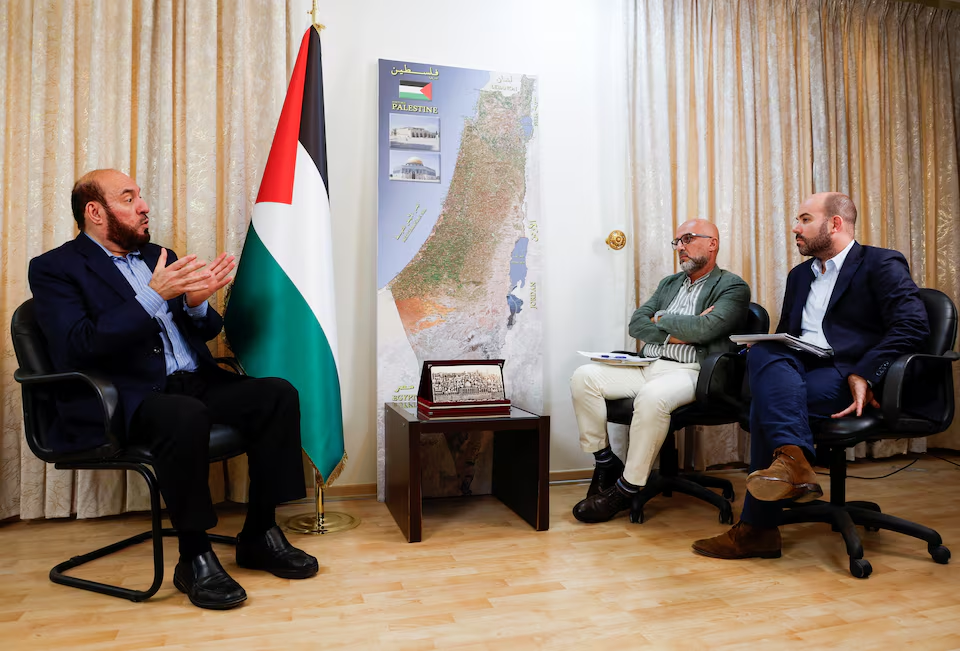News
Exclusive: Hamas Seeks to Retain Security Control in Gaza, Cannot Promise to Disarm — Senior Official

Hamas intends to maintain security control in Gaza for a period of time and cannot commit to giving up its weapons, a senior Hamas official told Reuters, underscoring the growing challenges facing the U.S. plan to end the war.
Mohammed Nazzal, a member of the Hamas political bureau, said the group was prepared to agree to a ceasefire lasting up to five years to allow for Gaza’s reconstruction. What happens after that, he said, would depend on whether Palestinians are given “a horizon and hope” toward full statehood.
Speaking from Doha, where Hamas leaders have long been based, Nazzal defended the group’s actions in Gaza — including the public executions carried out on Monday. “In times of war, exceptional measures are taken,” he said, adding that those executed were “convicted murderers.”
Disarmament Pressure
While Hamas has previously expressed similar positions, the timing of Nazzal’s comments highlights the major obstacles facing efforts to secure a lasting peace, coming just days after agreement on the first phase of a ceasefire.
His remarks underline the deep divide between Hamas’s stance and U.S. President Donald Trump’s plan for Gaza, which calls for disarmament and the establishment of a technocratic governing committee overseen by an international transitional body.
Asked about Nazzal’s comments, the office of Israeli Prime Minister Benjamin Netanyahu said Israel “remains committed to the ceasefire agreement and will uphold its obligations.”
“Under Stage 1, Hamas was required to release all hostages — it has not done so. Hamas knows where the bodies of our hostages are. Under this agreement, Hamas must disarm — there is no ambiguity about that. They have not done so. Hamas must adhere to the 20-point plan; time is running out,” the statement to Reuters said.
Trump’s September 29 plan calls for Hamas to immediately release all hostages, disarm, and hand governance to a technocratic committee under international supervision. Netanyahu endorsed the plan, saying it would “eliminate Hamas’s military capability, dismantle its political rule, and ensure Gaza never again poses a threat to Israel.”
According to Israeli figures, Hamas’s October 7, 2023 attacks killed 1,200 people and took 251 hostages, sparking the war. Gaza’s health authorities say nearly 68,000 people have since been killed by Israeli military operations.
Facing enormous pressure to disarm and relinquish control after devastating losses, Hamas has resisted calls to surrender its weapons.
When asked directly whether Hamas would give them up, Nazzal replied: “I cannot answer with a simple yes or no. Honestly, it depends on the nature of the project. What do you mean by disarmament? To whom would the weapons be handed over?”
He added that the issue of weapons, along with other topics to be discussed in the next phase of talks, concerns not just Hamas but all Palestinian armed groups — requiring broad consensus among Palestinians.
The White House, when asked about Nazzal’s remarks, referred Reuters to Trump’s previous comments.
“We have a commitment from them, and I believe they will honor it,” Trump said, noting that Hamas had returned more bodies but declining to discuss disarmament or its interim security role in detail.
Ceasefire, Security, and the Path Ahead
Nazzal said Hamas has no interest in keeping the bodies of dead hostages seized during the October 7 attacks. The group has handed over at least nine of the 28 bodies, he said, but technical difficulties have delayed further recoveries. He added that international partners such as Turkey or the U.S. could help locate the remaining remains.
A senior Turkish official said last week that Turkey would join Israel, the U.S., Qatar, and Egypt in a joint task force to locate the bodies.
Hamas agreed on October 4 to release all living hostages and transfer administrative control to a technocratic committee but insisted that other political matters be resolved within a broader Palestinian framework.
“The second phase of talks will begin soon,” Nazzal said.
Trump has said that Hamas “must disarm or be forced to do so,” but also acknowledged that the group was allowed to maintain a limited internal security presence during the transition. Nazzal confirmed there was an understanding about Hamas’s short-term role on the ground, though he gave few details.
“This is a transitional phase,” he said. “There will be a technocratic civil administration, but on the ground, Hamas will remain present — to protect aid convoys from looters and armed gangs.” Elections, he added, should follow the transition.
Nazzal said mediators had not discussed with Hamas the proposed international stabilization force for Gaza that is part of Trump’s ceasefire framework.
Hamas’s founding charter calls for Israel’s destruction, though its leaders have repeatedly offered long-term truces in exchange for a viable Palestinian state based on pre-1967 borders — an offer Israel dismisses as a tactical ploy.
Nazzal said Hamas had proposed a truce lasting three to five years to allow Gaza’s reconstruction. “The goal is not to prepare for another war,” he said.
“After that period,” he added, “countries must provide the Palestinian people with hope and a clear horizon for their future. Palestinians want a free and independent state.”
